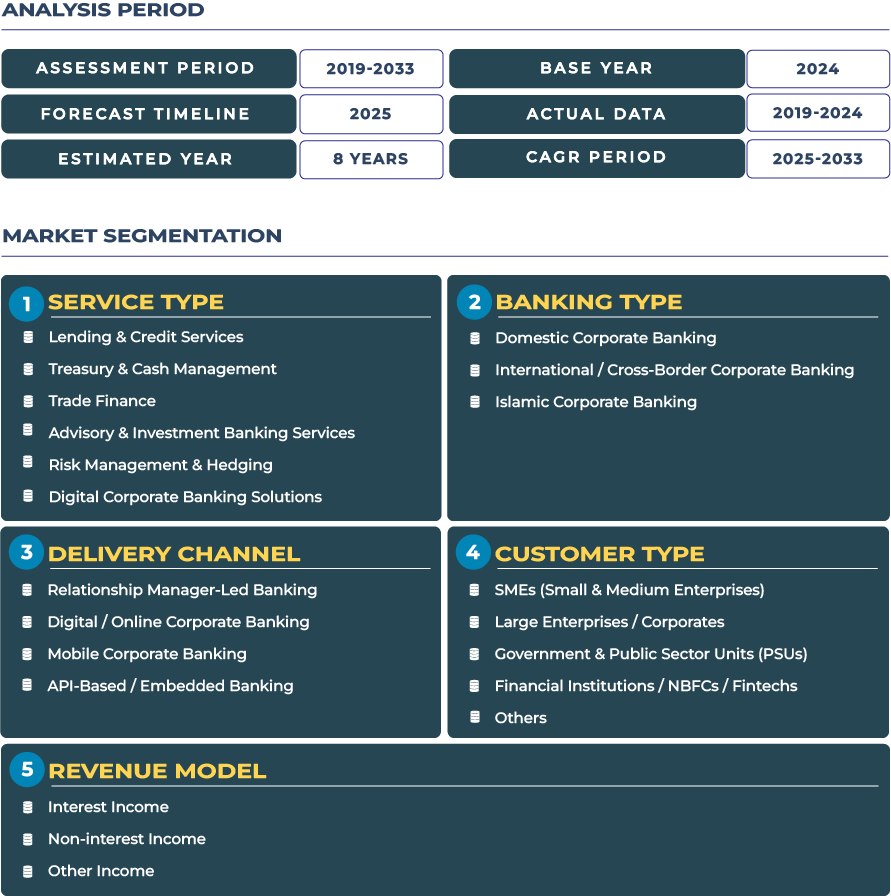Trade Finance & Corporate Cash Management in Thailand: The Engine for SME and Enterprise Scaling
Thailand corporate banking ecosystem is increasingly being defined by the capability of banks to deliver robust trade finance, cash management, and liquidity solutions tailored for both SMEs and large enterprises. In a country where export orientation and supply-chain linkages are vital, corporate banks are building platforms to streamline import/export financing, receivables discounting, and working capital optimisation. These banks help clients consolidate cash across subsidiaries, automate intra-group settlements, and integrate receivables data into treasury workflows. By doing so, they underpin the broader corporate banking market growth in Thailand, positioning this as more than a lender model, rather a service integrator in an evolving corporate banking industry.
Note:* The market size refers to the total revenue generated by banks through interest income, non-interest income, and other ancillary sources.
The Thailand corporate banking market is projected to reach USD 21.2 billion by 2025 and rise to USD 40.4 billion by 2033, implying a CAGR of 8.4% over the 2025–2033 period. This strong forecast reflects not only stronger credit uptake but also a growing share of fee income from treasury, trade, risk, advisory, and digital banking solutions. The expansion underscores the transition from commodity-based lending toward embedded services and value chain finance, driven by demand from manufacturing, agribusiness, tourism, and regional supply chains in ASEAN.
Market Outlook: Deepening Trade-Enabled Corporate Banking to Bridge Growth Gaps
As Thailand seeks to accelerate its transition into a regional trade and logistics hub, the corporate banking sector is being retooled to support that ambition. Banks must evolve from conventional credit providers to architects of integrated trade corridors, offering supply-chain financing, digital invoice discounting, and cross-border cash concentration. In doing so, they enable corporates to reduce working capital drag, improve yield on idle cash, and centralize liquidity functions amid volatile regional flows. The post-pandemic rebound in tourism, the gradual reorientation of supply chains, and infrastructure investments are catalysing demand for corporate cash and trade services.
However, this trajectory is not without headwinds. Thailand’s exposure to global trade cycles, geopolitical tensions, and macro volatility adds stress to credit quality and transaction volumes. The banking sector must buttress against rising non-performing loans and strike a balance between growth and credit discipline. In adapting to this environment, Thai corporate banks will need to invest in credit analytics, real-time transaction monitoring, and embedded risk engines to support scalable trade and treasury services.
Growth Drivers & Restraints: Catalysts and Constraints in Thailand Corporate Banking Evolution
Drivers behind Thailand’s corporate banking acceleration
The momentum is underpinned by Thailand’s strong manufacturing base and export activity, which propels working capital demands and trade finance needs. Many SMEs are now formalizing operations and transitioning to digital payments, creating a scalable base for digital cash management offerings. The deepening of cross-border trade ties with ASEAN neighbors, China, and South Asia further amplifies demand for multi-currency facilities, supplier financing, and receivables factoring. Meanwhile, the government’s push toward digital finance and green transition encourages banks to innovate solutions aligned with sustainability and supply chain resilience.
Constraints tempering Thailand corporate banking expansion
Yet, certain structural factors impede more aggressive growth. Regulatory restrictions on cross-border cash pooling and repatriation limit banks’ ability to centralize corporate cash across jurisdictions. Tourism volatility makes revenue streams unpredictable for banks serving hospitality clients. In many industries, cash and informal payments still persist, constraining full adoption of digital services. Moreover, elevated operational and compliance costs for banks servicing SMEs with smaller volumes may dampen margins unless scale can be achieved.
Trends & Opportunities: Digital Rails, Green Finance, and Supply-Chain Innovation in Thailand
Emerging Trends
Thailand corporate banking sector is witnessing the rise of digital corporate payment rails and API integrations enabling real-time receivables and payables processing. In manufacturing clusters like Bangkok, Chonburi, and Thai-industrial zones, supply-chain finance is gaining traction as banks partner with trade platforms, enabling loan products tied to purchase order flows. As tourism recovers, banking groups are crafting special financing for hotel and hospitality investments. Simultaneously, ESG-linked lending and green finance are increasingly embedded in credit structuring, encouraging sustainable corporate behavior.
Opportunities ahead for corporate banks
Banks can seize opportunities in tourism sector capex financing, offering asset-backed loans for hotel, resort, and infrastructure redevelopment. Cross-border SME finance (especially for exporters and trade intermediaries) is underpenetrated, banks that build digital underwriting and cross-jurisdictional liquidity can capture this gap. Adoption of corporate digital wallets and embedded treasury services for SMEs can further lock in client relationships and build stickiness. Moreover, banks that can aggregate regional flows from Myanmar, Cambodia, and Laos can anchor Thailand as a hub for ASEAN trade corridors.
Competitive Landscape: Strategic Moves Shaping Thailand Corporate Banking Frontier
Thailand corporate banking industry is dominated by major local players such as Bangkok Bank, Kasikornbank, Siam Commercial Bank (SCB), and Krungthai Bank, alongside regional and global institutions. These banks are executing strategies such as offering tourism recovery finance packages, deploying cross-border SME supply-chain finance, and launching corporate digital wallet platforms. For example, SCB has rolled out digital trade portal services integrating procurement and financing, while Kasikornbank leverages its extensive SME network to embed cash management services. Bangkok Bank is actively financing infrastructure and logistics players, aligning with Thailand’s ambition to be a regional gateway.
These banks are investing in technology platforms for real-time treasury services, open APIs, and ESG-linked credit frameworks. Their competitive edge will hinge on their ability to bundle advisory, hedging, and capital solutions around corporate clients rather than merely offering standalone lending. In a market where margins are under pressure, differentiation will rest on embedded services, automation, and trust-driven partnerships.








